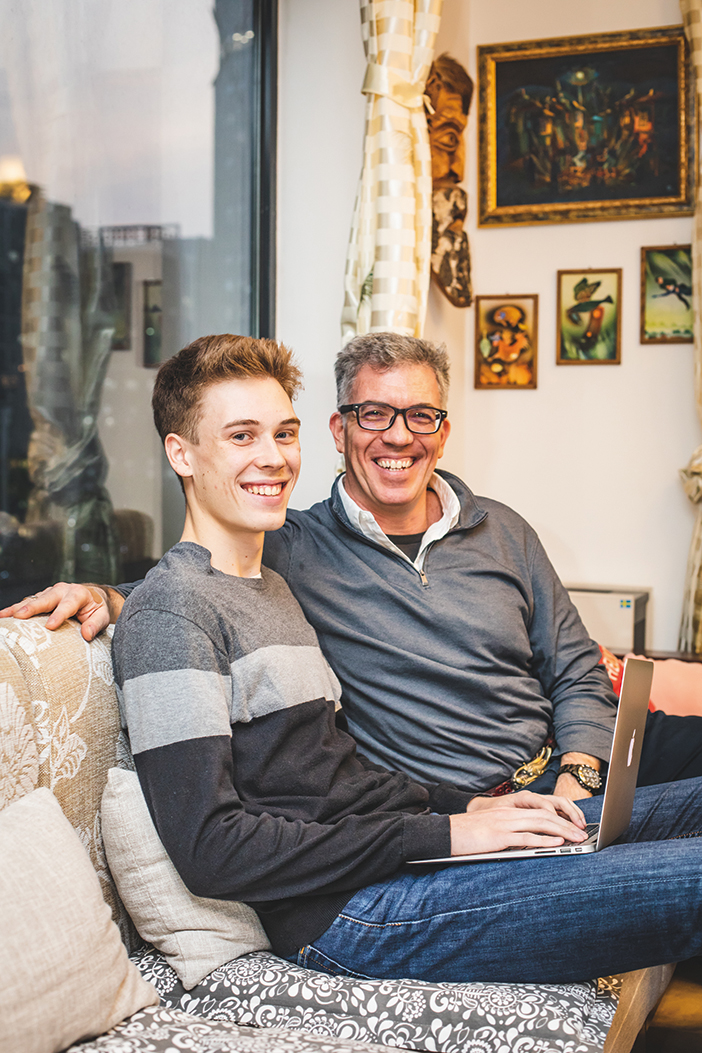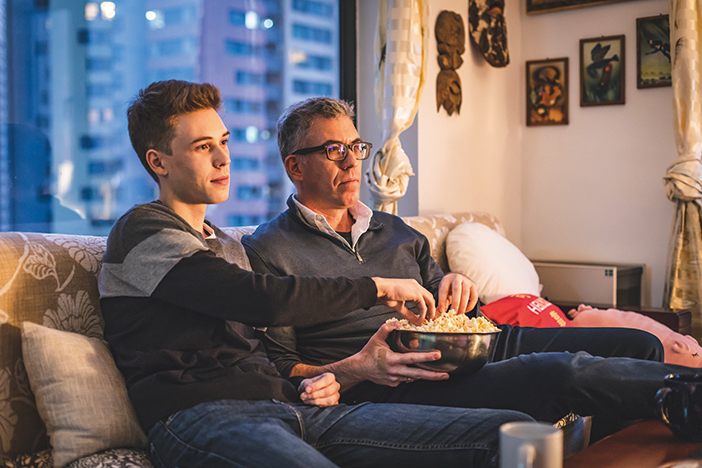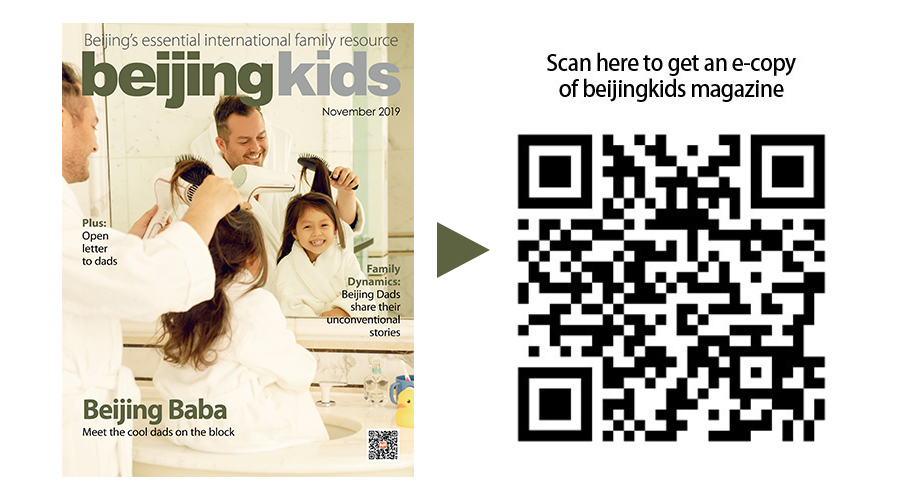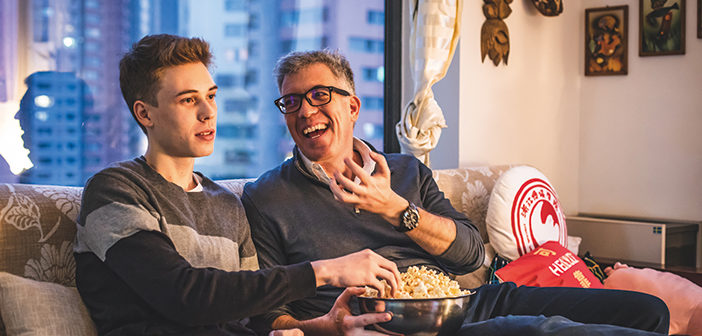I didn’t have to move. Nothing forced me to. But I did it for him – for my son. And for a toilet.
I’d been living alone in Beijing, in a cozy, two-bedroom, one-bathroom apartment. Enough space for a guest to stay over. Besides, psychologists say that packing up your “entire life,” to leave an old home for a new one, ranks among the most traumatic of life experiences.
So, why submit myself to this ordeal, if I wasn’t compelled to?
To happily provide my 17-year-old son, Miksa, with his own bathroom: toilet, shower, and sink. And two months later – though the luxury of living in a two-bed, two-bath apartment costs me a few extra thousand RMB per month – it’s no exaggeration to say: it’s been one of my wisest investments ever.
After all, you’d be willing to pay a price to avoid daily conflict, wouldn’t you? In fact, his bathroom has come to symbolize our evolving relationship today. Let me explain, because mine is no ordinary tale of single-father parenting, or of a typical expat family in China. It’s a hybrid of both.
Moreover, while I like the cute notion of us being “roommates,” writing this article inspired me to ponder: what exactly does distinguish us from actual roommates? And what’s the difference between living alone with my son in China, versus back home in America – or anywhere else in the world? Is there anything unique about my single-father parenting here?
From the moment he moved in, in August, so began our journey over the next year. It’ll be a memorable one, mostly because of our unique living arrangement: as a foreign father and son, together in an alien land. There’s also this: for the first time in his 17 years, he only has me. And I only have him.
His Mom, and my two other children – our younger son, 15, and our daughter, 10 – left Beijing this summer. They’d lived in China for four years, together with Miksa. I’d often stay with the kids, as their mother routinely traveled for her work in international development. When she was offered an important post in Istanbul, Turkey in August, our two younger ones followed her there.
 Miksa, though, stayed behind with me. It was the right move, as he faced a pivotal year: finishing his high-school career, while applying to universities. We couldn’t imagine the alternative – and potential turmoil – of extracting him from his solid support system of friends and teachers. Fortunately, the timing worked well for me, too: I’d recently signed a one-year contract with a new employer.
Miksa, though, stayed behind with me. It was the right move, as he faced a pivotal year: finishing his high-school career, while applying to universities. We couldn’t imagine the alternative – and potential turmoil – of extracting him from his solid support system of friends and teachers. Fortunately, the timing worked well for me, too: I’d recently signed a one-year contract with a new employer.
As expected, though, the separation from family has been hard for both of us. No amount of texting or video-chats can remedy that. Still, I shouldn’t feel too sorry for myself: among the growing number of single-parent households, I imagine each is tinged with sadness. At least Miksa and I have each other. We do express, regularly, that we love each other – and kiss each other good-night.
That’s also why I was determined to make him as comfortable as possible. Physically and emotionally. Having his own bathroom, then, serves as a metaphor.
That said, our cohabitation hasn’t unfolded quite as anticipated. Once we decided that he’d stay with me, I romanticized the potential, like a character-driven reality-show: outside, an American father-and-son, exploring exotic China together. Should we travel next to Tibet – or Xinjiang? Inside, two “eligible bachelors,” navigating the potential awkwardness of inviting over a guest.
In reality, we don’t see each other that much. Miksa rises early, to catch a 7:15am bus to school, while my job often requires me to work nights. I’m proud that he’s self-driven enough to work deep into most school nights, and through much of the weekend, to hoist his grades and SAT scores even higher.
He’s also trustworthy – and capable enough with his Mandarin – that when he ventures into the city with friends, I don’t worry about what time he’ll be home. When I told him I’d note his trustworthiness in this article, he replied with a wry smile: “Well, why wouldn’t you trust me?”
True, true. But that may change, with the first time I smell booze on his breath.
That said, I won’t sugarcoat the experience so far. Living with him includes just as many anxieties and frustrations as when we were a “happy” family of five. I can be cranky and impatient. Like every other “normal” parent, I also have pangs of insecurity: Am I doing this right?
We laugh, we bicker. We have our ups and downs: from going out for dinner and chatting about world affairs, to ordering in and watching a movie; from assisting him with university application articles, to exhorting him to not treat me as his personal ayi. (Are you allergic to washing dishes?)
Miksa himself doesn’t like my half-joking use of the term “roommates.” As he explained: “Then couldn’t all families be considered ‘roommates’?” Excellent point, Counselor.
He doesn’t even like the idea of this article. “You’re going to roast me, aren’t you? Then I’ll write a counter-article, roasting you!”
Still, I find time for the stuff that marks us from real roommates: namely, parenting. I feel entitled to sometimes lecture him about undesirable behaviors, despite his clichéd resistance. That’s still my “job.” Though, it can be easy to forget a child needs it, when he’s already taller than his (taller-than-average) father; has begun shaving (occasionally); and will soon be old enough to enlist in the military.
Our daily routines illustrate this. Starting with breakfast, which also symbolizes something more. No, we don’t eat together. Instead, I wake up earlier than necessary, just to prepare him a breakfast to go. Sure, he’s old enough to make it for himself. And definitely capable.
But I do it for three reasons. First, he used to live in Shunyi, a five-minute bike ride from school. Now he lives in Chaoyang, about an hour away – but close to my workplace. So, I feel badly that he’s lost an hour of sleep. Saving him a few precious minutes, then, is the least I can do.
 Second, it may not sound like much, but when I pack up two or three tasty items for his breakfast, I find comfort knowing that I’m doing at least one thing, this day, to be a good father. Again, it’s a tiny gesture, but somehow eases my guilt over the distance from my two other children.
Second, it may not sound like much, but when I pack up two or three tasty items for his breakfast, I find comfort knowing that I’m doing at least one thing, this day, to be a good father. Again, it’s a tiny gesture, but somehow eases my guilt over the distance from my two other children.
Third, for years I’ve preached the importance of “selfless acts”: at least once in the morning, a selfless act for your siblings; at night, at least once for your hardworking mother. Would it kill ya?
Since no one likes a hypocrite, why not show him, not just tell him? By waking up for him, for this small act, I set an example. He even seems to appreciate my teamwork.
Then there’s the housework. I recall once seeing a sign, along a nature hike: Leave no footprints. Pick up your trash. That’s a life lesson about personal responsibility, too. Clean up your own mess.
Well, for kids pampered for years by an ayi, deprogramming isn’t easy. Yes, I do nearly all the dishwashing, clothes washing, room tidying, etc. Occasionally, I erupt. I’ve also warned him: “At college next year, you’ll have a real roommate – who may hate you for your messiness.”
That said, some points resonate. He likes his shirts ironed, so I taught him. I’m pleased to see that every Sunday night, while we watch a movie, Miksa irons his five shirts for the week.
One step for man, one giant leap … toward manhood!
Nevertheless, writing this article reminds me: time’s flying. I should carve out enough quality time with him, during each weekend. The year will be over before we know it.
Overall, I aim for one (seemingly) simple objective: in the future, when Miksa looks back on our year together, all I hope is that he recalls it with fondness.
I think we’re on our way.
Photos: Uni You
 This article appeared in the beijingkids November 2019 Beijing Baba issue
This article appeared in the beijingkids November 2019 Beijing Baba issue




